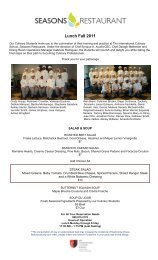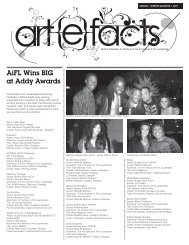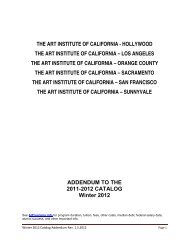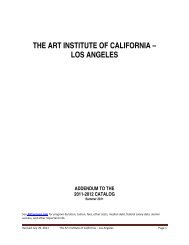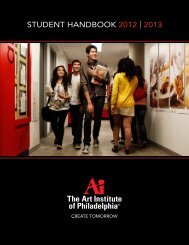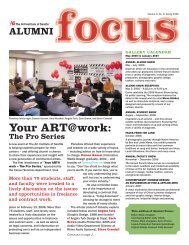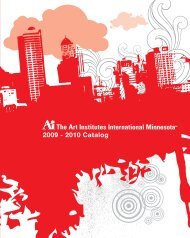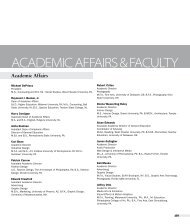CATALOG 2011-2012 - The Art Institutes
CATALOG 2011-2012 - The Art Institutes
CATALOG 2011-2012 - The Art Institutes
You also want an ePaper? Increase the reach of your titles
YUMPU automatically turns print PDFs into web optimized ePapers that Google loves.
Although not exhaustive, the following<br />
list represents the types of sanctions<br />
that may be imposed upon any student<br />
or student organization found to have<br />
violated the student conduct policy:<br />
1. Warning: A notice in writing that a student<br />
has failed to meet some aspect of the<br />
school’s standards and expectations.<br />
2. Probation: Probation is used for repeated<br />
violations or a specific violation of a serious<br />
nature. <strong>The</strong> Chief Conduct Officer or his/her<br />
delegate defines the terms of probation.<br />
3. Discretionary Sanctions: <strong>The</strong> student<br />
will be required to complete an<br />
educational service, attend counseling,<br />
or have restricted privileges.<br />
4. Removal from Sponsored Housing: <strong>The</strong><br />
student will be immediately dismissed from<br />
school-sponsored housing. <strong>The</strong> student<br />
will be required to vacate the premises<br />
according to the terms of the sanction.<br />
5. Suspension: Separation of the student from<br />
the school for a pre-determined period of<br />
time. <strong>The</strong> student may be able to return<br />
to school once specified conditions for<br />
readmission are met. <strong>The</strong> student may<br />
not attend classes, visit college-sponsored<br />
housing, use school facilities, participate in<br />
or attend college activities, or be employed<br />
by the school during his/her suspension.<br />
6. Expulsion: <strong>The</strong> student will be expelled from<br />
<strong>The</strong> <strong>Art</strong> <strong>Institutes</strong> International Minnesota<br />
immediately. <strong>The</strong> student will not be<br />
permitted to continue his or her studies<br />
at the college and may not return to the<br />
college or to college-sponsored housing<br />
or activities at any time or for any reason.<br />
7. Restitution: Compensation for loss or damage<br />
to property leased, owned or controlled<br />
by the school. This may take the form<br />
of monetary or material replacement.<br />
<strong>The</strong> above list is only a general guideline.<br />
Some sanctions may be omitted, and other<br />
sanctions not listed above may be used.<br />
SECTION VII. DISCIPLINARY PROCEDURES:<br />
Complaint<br />
Any member of <strong>The</strong> <strong>Art</strong> <strong>Institutes</strong> International<br />
Minnesota community may file a complaint<br />
against any student for misconduct or for<br />
otherwise being in violation of <strong>The</strong> <strong>Art</strong><br />
<strong>Institutes</strong> International Minnesota policies.<br />
1. <strong>The</strong> complaint shall be prepared in<br />
writing and directed to the Chief<br />
Conduct Officer or his/her delegate.<br />
2. <strong>The</strong> written complaint should include the<br />
nature of the offense, date, approximate<br />
time and location of incident. <strong>The</strong><br />
name of the victim, offender and<br />
any witness/es may be included.<br />
3. Complaints should be submitted within<br />
48 hours after the alleged violation<br />
occurred unless there are extenuating<br />
circumstances requiring a longer timeframe.<br />
<strong>The</strong> Chief Conduct Officer or a delegate may<br />
review and investigate the complaint to<br />
determine if the allegations have factual merit, to<br />
identify violations of the student conduct policy,<br />
and to impose sanctions for such violations.<br />
Generally, the accused should be given the<br />
opportunity to tell his or her account of the<br />
situation and to provide this information, in<br />
writing, unless <strong>The</strong> <strong>Art</strong> <strong>Institutes</strong> International<br />
Minnesota determines that the circumstances do<br />
not warrant disclosure of some or all of the facts.<br />
Search of Student’s Property<br />
Students have no expectation of privacy in<br />
their personal property while on campus. <strong>The</strong><br />
<strong>Art</strong> <strong>Institutes</strong> International Minnesota reserves<br />
the right to search the contents of students’<br />
personal property or belongings at any time<br />
and for any reason, including when there is<br />
reasonable suspicion on the part of <strong>The</strong> <strong>Art</strong><br />
<strong>Institutes</strong> International Minnesota staff that a risk<br />
to the health, safety or welfare of students, and/<br />
or the school community exists and including<br />
searches pursuant to an investigation of potential<br />
wrong doing. This includes but is not limited<br />
to vehicles brought onto property leased,<br />
owned or controlled by the school, backpacks,<br />
portfolios and clothing. This policy also applies<br />
to student property in school-sponsored<br />
housing, student e-mail and/or computers.<br />
Notification and Determination of Violations<br />
that Warrant Disciplinary Meeting<br />
1. <strong>The</strong> Chief Conduct Officer or a delegate may<br />
choose to conduct a disciplinary meeting.<br />
Potential attendees include a student or<br />
students, the Chief Conduct Officer or his/<br />
her delegate and others who may have<br />
relevant information. <strong>The</strong> Student should<br />
receive advance notice of the allegations<br />
and the reason for the meeting.<br />
2. <strong>The</strong> Chief Conduct Officer or his/her delegate<br />
may render and communicate the decision<br />
to the student in writing, which shall describe<br />
the violation and the sanctions imposed,<br />
if any, and the student’s right to appeal. If<br />
the Chief Conduct Officer determines that<br />
there was no violation, that decision may be<br />
documented in writing to the student as well.<br />
3. If a student fails to appear for the meeting,<br />
the Chief Conduct Officer or his/her<br />
delegate may make a determination<br />
of violations of <strong>The</strong> <strong>Art</strong> <strong>Institutes</strong><br />
International Minnesota policies on the<br />
basis of the information available, and<br />
impose sanctions for such violations.<br />
Notification and Determination of Violations<br />
that Warrant Disciplinary Hearing<br />
In some cases, involving serious violations,<br />
the Chief Conduct Officer or delegate, hereby<br />
referred to as “Hearing Officer”, in his or her<br />
sole discretion, may choose to assemble a<br />
disciplinary panel to adjudicate the process.<br />
1. <strong>The</strong> Hearing Officer may immediately (before<br />
a hearing takes place) remove the student<br />
from the campus community pursuant to<br />
an Interim Suspension until the Disciplinary<br />
Panel is convened. (See Interim Suspension).<br />
2. <strong>The</strong> Student should receive advance<br />
notice of the allegations and the<br />
reason for the meeting. A student may<br />
forgo attendance at the hearing and<br />
a determination of the sanction will<br />
be made by the Disciplinary Panel.<br />
3. Hearings normally shall be conducted<br />
in private. <strong>The</strong> Disciplinary Hearing<br />
is an academic hearing, not a legal<br />
hearing. <strong>The</strong>refore, legal counsel<br />
is not allowed at the hearing.<br />
4. <strong>The</strong> student may be accompanied by one<br />
person (family member, friend, etc) to<br />
provide support. <strong>The</strong> committee may prohibit<br />
from attending or remove any person who<br />
disrupts the proceedings of the committee.<br />
5. In Hearings involving more than one<br />
STUDENT, the Hearing Officer, in his<br />
or her discretion, may permit the<br />
hearing concerning each student<br />
to be conducted separately.<br />
6. <strong>The</strong> Disciplinary Panel may hear from<br />
any person who may have relevant<br />
information and the Panel may review<br />
any documents presented to them.<br />
a. Pertinent records, documents<br />
and written statements may<br />
be considered by the Hearing<br />
Officer at his/her discretion<br />
b. <strong>The</strong> Disciplinary Panel may<br />
ask questions and may seek<br />
information not provided to it.<br />
7. <strong>The</strong> Disciplinary Panel may determine<br />
whether it is more likely than not<br />
that a violation occurred <strong>The</strong><br />
Panel should communicate to the<br />
Hearing Officer its decision and its<br />
recommended sanction, if any.<br />
8. After the Hearing, the Hearing Officer will<br />
issue a written decision to the accused<br />
student which identifies the accusations<br />
and the panel’s conclusions, any sanctions,<br />
and the student’s right of appeal.<br />
9. In general, the accused should have<br />
access to the documentation reviewed<br />
by the panel, however identifying names<br />
and information may be removed from<br />
the documentation when necessary to<br />
protect other student’s privacy rights.<br />
Disciplinary Panel<br />
A Disciplinary Panel may consist of members<br />
of the college Executive Committee, Campus<br />
Staff, Faculty or Student Body. When<br />
students are permitted on the panel, the<br />
accused student should sign a form granting<br />
permission to release his/her educational<br />
records to a student serving on the panel.<br />
Failure to sign the permission constitutes an<br />
agreement to have no student on the panel.<br />
Administrative Interim Suspension<br />
Students may be administratively<br />
suspended on an interim basis when:<br />
1. serious allegations are being investigated<br />
2. serious allegations are pending<br />
before a disciplinary panel<br />
3. in advance of a disciplinary panel hearing; or<br />
4. when a student potentially poses a threat of<br />
harm to himself, to others, or to property of<br />
<strong>The</strong> <strong>Art</strong> <strong>Institutes</strong> International Minnesota<br />
or a member of the college community<br />
During the interim suspension, students are<br />
denied access to college-sponsored housing and/<br />
or to the school (including classes, labs, library)<br />
and/or all other school activities or privileges<br />
for which the student might otherwise be<br />
eligible, as the Chief Conduct Officer or designee<br />
may determine to be appropriate. This interim<br />
suspension period should last no longer than<br />
three business days, and the Chief Conduct<br />
Officer or delegate may make reasonable<br />
provisions to provide for accommodations<br />
of a student in school sponsored housing.<br />
THE ART INSTITUTES INTERNATIONAL MINNESOTA



